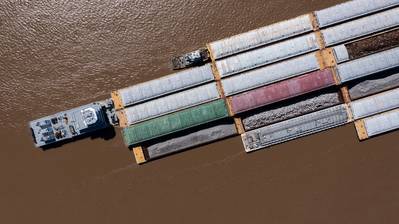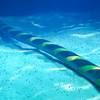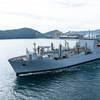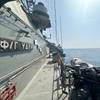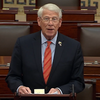AWO at 80: Looking Back, Looking Forward on Safety, Security & Sustainability
This year, AWO marks its 80th anniversary as the tugboat, towboat and barge industry’s advocate, resource and united voice for safe, sustainable and efficient transportation on America’s waterways, oceans and coasts. As we celebrate this milestone, we not only recognize and reflect on 80 years of advocacy for our industry as a key driver of the U.S. economy, but also 80 years of vital work as a safety and sustainability leader and security partner – protecting mariners, communities and our waterways from harm.
At a time when the men and women of America’s essential workforce, the resiliency and sustainability of the global supply chain, and our nation’s intensifying geopolitical rivalry with China are top of mind for Americans, marine transport’s role in ensuring safer, more sustainable maritime commerce and a more secure United States is as vital as it has ever been. Over the past 80 years, led by member companies of all sizes operating in all regions of the country and all sectors of the industry, AWO has built a strong foundation of steady and ongoing progress in these areas, which positions us well to tackle the evolving safety, security and environmental priorities of the future.
Our industry’s commitment to safety is rooted in our determination to build a culture of continuous improvement that goes above and beyond regulatory requirements. That culture led to the establishment of the Coast Guard- AWO Safety Partnership, now in its 29th year – a non-regulatory, data-driven, cooperative framework dedicated to advancing safety on the waterways. The partnership in turn laid the groundwork for Subchapter M, which raised the safety bar across our industry, and acknowledged important past progress by recognizing the AWO Responsible Carrier Program as an accepted safety management system and focusing the Coast Guard’s finite resources where they were needed most. And AWO’s development of its Safety Statistics Reporting Program (SSRP) reinforced these milestones by creating a mechanism for our industry to continuously measure and benchmark our collective safety performance. The latest Coast Guard-AWO Annual Safety Report illustrates the results of these efforts, showing that in 2023, the towing industry recorded its second-lowest crew fatality rate in nearly thirty years.
Building on these results for the future will require focusing our safety work on forging and strengthening partnerships, facilitating the safe flow of commerce on our waterways, and continuing to expand mariner safety efforts beyond preventing job-related injuries. AWO’s ongoing work with the Oil Companies International Marine Forum to apply our experience with SubM to OCIMF’s SIRE program, and with the Maritime Administration to apply knowledge gained from the SSRP to MARAD’s near-miss-reporting framework; our collaboration with the Coast Guard and Army Corps of Engineers to ensure safe and efficient navigation during hurricanes, low water, and other weather events; our newly-established AWO Bridge Event Recording Program to identify and address issues with bridges on the inland river system; and our efforts to improve mariner mental health and continue providing work environments safe from sexual assault and sexual harassment, are all major areas of safety focus for AWO moving forward.
 © dvande / Adobe Stock
© dvande / Adobe Stock
Through AWO, our industry has also played a key role in protecting our national and homeland security. Our work over several decades educating policymakers on the security benefits of the Jones Act – as an indispensable asset in maintaining American control over our domestic supply chain; as a force multiplier that ensures a pipeline of qualified American mariners to support military sealift operations; and as a safeguard against foreign operators navigating on our domestic waterways and further complicating the Coast Guard’s homeland security mission – has resulted in consistently strong, bipartisan support for this vital law. Alongside our Jones Act advocacy, AWO has also fought for thoughtful, risk-based policies that strengthen maritime security while prudently allocating finite government and industry resources, whether through Coast Guard approval of the industry-developed AWO Alternate Security Program, or introduction of a TSA online renewal process for TWIC holders to eliminate the need for mariners to travel to renew a TWIC.
Looking forward, among our country’s most prominent national security challenges will be China’s maritime expansionism, which will require a strong American maritime industrial base to act as a counterweight. This means expanding support for the Jones Act and educating the next generation of policymakers on the law’s importance will remain critically important. And as the marine transportation system continues to be targeted by increasingly sophisticated and high-impact cyberattacks, AWO will be sharply focused on ensuring that vessel operators are well prepared and working closely with the Coast Guard to address these threats, as well as advocating for practical, risk-based regulations that recognize one size does not fit all.
As we have focused on making our industry safer and our nation more secure, AWO and its members have also led key efforts to continuously improve our environmental performance and bring our industry’s perspective and expertise to the global discourse on sustainability. Publication of AWO’s Environmental Stewardship Best Practices set a high bar for sustainability across our industry; and the Coast Guard-AWO Safety Partnership has not only yielded positive results in mariner safety, but has also led to a significant decrease in oil spills over time, with 2023 marking the fourth-lowest tank barge oil spill rate since 1995.
Meanwhile, looking to the future, AWO’s CEO Sustainability Task Force has charted a visionary course for engaging policymakers and the public on sustainability. The task force’s recommendations include effectively telling our industry’s positive sustainability story, emphasizing our environmental advantages over other modes of freight transport; and advocating for policies that encourage demand for marine transportation, secure investment in waterways infrastructure to reduce congestion, and prevent adoption of regulatory patchworks or infeasible requirements that would harm the efficiency and resiliency of the marine transportation system, while supporting companies in innovating and investing to further improve the sustainability of their operations.
For decades, the American tugboat, towboat and barge industry has been an outsized contributor in safety, security and sustainability while delivering prosperity to our nation. Guided by our diverse and dynamic membership, AWO looks forward to navigating the challenges and seizing the opportunities of the next 80 years.
About the Authors: Kelly Teichman, executive chairman of the T&T Group of Companies, and AWO chairman of the board; Patrick Sutton, senior vice president of fleet development and strategy for American Commercial Barge Line, AWO vice chairman of the board



